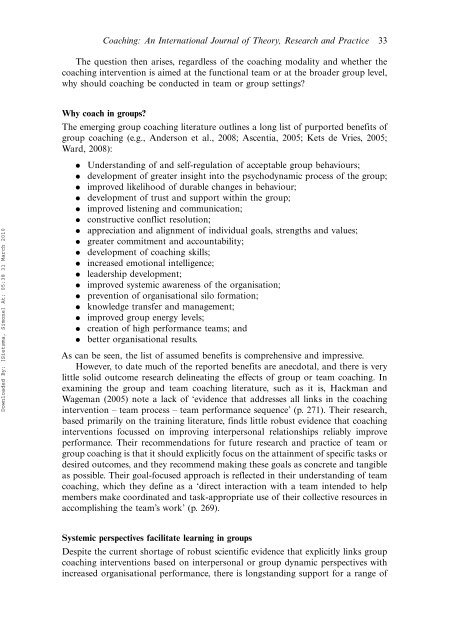32 S.W. Brown <strong>and</strong> A.M. GrantDownloaded By: [Sietsma, Simone] At: 05:38 31 March 2010teams, whether participants are working together towards specific goals or not. Inthis paper we primarily focus on the broader group coaching categorisation, but wedraw on literature from both team coaching <strong>and</strong> group coaching perspectives.Group coaching involves a coach (or coaches) <strong>and</strong> two or more coachees, <strong>and</strong> thistype <strong>of</strong> coaching st<strong>and</strong>s in contrast to the more commonly-practiced individual orone-to-one coaching which is conducted in a dyadic form with a coach <strong>and</strong> a singlecoachee. Like dyadic coaching, group coaching tends to be focussed on change <strong>and</strong>growth. However, a primary difference between the practice <strong>of</strong> group coaching <strong>and</strong>the practice <strong>of</strong> dyadic coaching is that group coaches need a strong underst<strong>and</strong>ing <strong>of</strong>group dynamics or group-based dialogue processes, in addition to the individualinterpersonal <strong>and</strong> rapport-building skills necessary for dyadic coaching. Thus, in thesame way that dyadic coaching requires the coach to be able to develop goodindividual rapport with the coachee, group coaching requires good rapport at thegroup level, <strong>and</strong> an underst<strong>and</strong>ing <strong>of</strong> group dynamics is essential for this to occur.Approaches to dyadic coaching vary considerably in relation to the way thatcoaching is delivered. For example, some approaches emphasise a non-directiveapproach to coaching, others focus more on the delivery <strong>of</strong> expert advice fromconsultants, some emphasise the role <strong>of</strong> the internal coach compared to the externalcoach (for discussion see Stober & Grant, 2006). Similarly, the emerging groupcoaching literature also presents a number <strong>of</strong> different accounts <strong>of</strong> group coaching.Some approaches use a combination <strong>of</strong> individual <strong>and</strong> group coaching, otherapproaches focus on coaching individuals on their individual goals within a groupsetting. Some focus on coaching the group as a unique entity with a focus on thegroup dynamics. Yet others use various combinations <strong>of</strong> these together.<strong>An</strong>derson, <strong>An</strong>derson <strong>and</strong> Mayo (2008) <strong>and</strong> Diedrich (2001) coach simultaneouslyat the group <strong>and</strong> individual level, depending on whether the developmentneed is one for the group or specifically for an individual. Ward (2008) works withleaders from different organisations in a single group setting, which is primarilyfocussed on the development <strong>of</strong> the individual within the group, while leveraginginput from a range <strong>of</strong> varying peer perspectives <strong>and</strong> experiences.Kets de Vries (2005) takes a purposefully holistic perspective in his work withleadership groups <strong>and</strong> teams. He simultaneously provides coaching, develops theindividual participant’s own coaching skills, <strong>and</strong> then facilitates a process <strong>of</strong> peercoaching to maximise insight <strong>and</strong> overcome group <strong>and</strong> individual obstacles togrowth. Finally, participants are then encouraged to cascade a similar approachthrough their own teams using the coaching skills <strong>and</strong> approaches they have learnt.Some authors such as <strong>An</strong>derson et al. (2008), Diedrich (2001), <strong>and</strong> Ward (2008)have emphasised the role <strong>of</strong> the external coach who comes into the organisation toprovide group coaching services to functional group <strong>and</strong> senior executive teams.In such approaches the emphasis is <strong>of</strong>ten on the goal-focused nature <strong>of</strong> coaching. Incontrast, the work <strong>of</strong> Hackman <strong>and</strong> Wageman (2005) has tended to emphasise therole <strong>of</strong> the internal coach, proposing that team coaching should ideally be one <strong>of</strong> asubset <strong>of</strong> acts <strong>of</strong> leadership which is conducted by either the formal team leader ora member <strong>of</strong> the team rather than by external coaches or consultants. Others take amore inclusive position <strong>and</strong> argue that group coaching aimed at facilitatingteam building or leadership effectiveness can be appropriately implemented byeither an external coach or a team leader acting as an internal coach (Goldsmith &Morgan, 2000).
<strong>Coaching</strong>: <strong>An</strong> <strong>International</strong> <strong>Journal</strong> <strong>of</strong> <strong>Theory</strong>, <strong>Research</strong> <strong>and</strong> Practice 33The question then arises, regardless <strong>of</strong> the coaching modality <strong>and</strong> whether thecoaching intervention is aimed at the functional team or at the broader group level,why should coaching be conducted in team or group settings?Why coach in groups?The emerging group coaching literature outlines a long list <strong>of</strong> purported benefits <strong>of</strong>group coaching (e.g., <strong>An</strong>derson et al., 2008; Ascentia, 2005; Kets de Vries, 2005;Ward, 2008):Downloaded By: [Sietsma, Simone] At: 05:38 31 March 2010. Underst<strong>and</strong>ing <strong>of</strong> <strong>and</strong> self-regulation <strong>of</strong> acceptable group behaviours;. development <strong>of</strong> greater insight into the psychodynamic process <strong>of</strong> the group;. improved likelihood <strong>of</strong> durable changes in behaviour;. development <strong>of</strong> trust <strong>and</strong> support within the group;. improved listening <strong>and</strong> communication;. constructive conflict resolution;. appreciation <strong>and</strong> alignment <strong>of</strong> individual goals, strengths <strong>and</strong> values;. greater commitment <strong>and</strong> accountability;. development <strong>of</strong> coaching skills;. increased emotional intelligence;. leadership development;. improved systemic awareness <strong>of</strong> the organisation;. prevention <strong>of</strong> organisational silo formation;. knowledge transfer <strong>and</strong> management;. improved group energy levels;. creation <strong>of</strong> high performance teams; <strong>and</strong>. better organisational results.As can be seen, the list <strong>of</strong> assumed benefits is comprehensive <strong>and</strong> impressive.However, to date much <strong>of</strong> the reported benefits are anecdotal, <strong>and</strong> there is verylittle solid outcome research delineating the effects <strong>of</strong> group or team coaching. Inexamining the group <strong>and</strong> team coaching literature, such as it is, Hackman <strong>and</strong>Wageman (2005) note a lack <strong>of</strong> ‘evidence that addresses all links in the coachingintervention team process team performance sequence’ (p. 271). Their research,based primarily on the training literature, finds little robust evidence that coachinginterventions focussed on improving interpersonal relationships reliably improveperformance. Their recommendations for future research <strong>and</strong> practice <strong>of</strong> team orgroup coaching is that it should explicitly focus on the attainment <strong>of</strong> specific tasks ordesired outcomes, <strong>and</strong> they recommend making these goals as concrete <strong>and</strong> tangibleas possible. Their goal-focused approach is reflected in their underst<strong>and</strong>ing <strong>of</strong> teamcoaching, which they define as a ‘direct interaction with a team intended to helpmembers make coordinated <strong>and</strong> task-appropriate use <strong>of</strong> their collective resources inaccomplishing the team’s work’ (p. 269).Systemic perspectives facilitate learning in groupsDespite the current shortage <strong>of</strong> robust scientific evidence that explicitly links groupcoaching interventions based on interpersonal or group dynamic perspectives withincreased organisational performance, there is longst<strong>and</strong>ing support for a range <strong>of</strong>
















